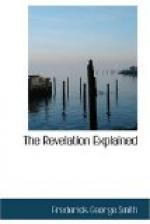Again, it was the beast that came up at the expiration of the twelve hundred and sixty years, or Protestantism, that slaughtered the witnesses, and we could not expect their resurrection during the reign of Protestantism, which every one will admit was longer than three and one-half years, according to the year-day application. The events as they have developed prove that it was just three and one-half centuries before Protestantism was entirely ignored and the Spirit and Word recognized as the sole Governors in the church of God. Besides, the general trend of events following the formation of Protestantism naturally divide the succeeding centuries into separate periods. The first (sixteenth) was a fierce conflict for the establishment of Protestantism; the second (seventeenth) was a violent reaction, wherein the church of Rome nearly triumphed over her hated opposers; while the third (eighteenth) is specially noted in history as the period of infidelity or reason. This division of time was so noticable that D’Aubigne, who wrote about A.D. 1835, in his famous History of the Reformation, refers to it in the following remarkable language: “It has been said that the three last centuries, the sixteenth, the seventeenth, and the eighteenth, may be conceived as an immense battle of three days’ duration. We willingly adopt this beautiful comparison.... The first day was the battle of God, the second the battle of the priest, the third the battle of Reason. What will be the fourth? [1830-1930] In our opinion, the confused strife, the deadly contest of all these powers together, TO END IN THE VICTORY OF HIM TO WHOM TRIUMPH BELONGS.” Book XI, Chap. 9.
The writer is thankful to God that he is permitted to see the fourth day ending “in the victory of Him to whom triumph belongs.” And may we, my brethren, be grateful to our dear Lord that it is our privilege to have part in this glorious reformation of divine truth that is now sweeping over the world and gathering the elect together for the soon-coming of the Savior.
13. And the same hour was there a great earthquake, and the tenth part of the city fell, and in the earthquake were slain of men seven thousand: and the remnant were affrighted, and gave glory to the God of heaven.
14. The second woe is
past; and, behold, the third woe cometh
quickly.
At the time the witnesses reach their greatest exaltation, a great earthquake takes place upon earth, and the tenth part of the city falls. The nature of the symbol would point us to some political upheaval. Since the great city of Babylon is composed of different divisions (as will be seen hereafter), it is a matter of doubt as to which part of the city is here referred to; but most probably that of the hierarchy as embraced in one of the ten divisions or kingdoms. Since the fulfilment of this prediction is yet future, I speak with hesitation and wait for the event to make all clear. It is probable, however, that either in this political revolution, or about that time, the Ottoman power will be overthrown; for immediately the announcement is made, “The second woe is past; and, behold, the third woe cometh quickly.”




